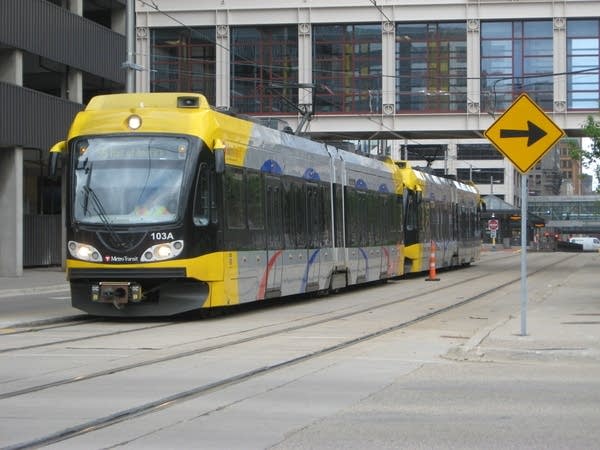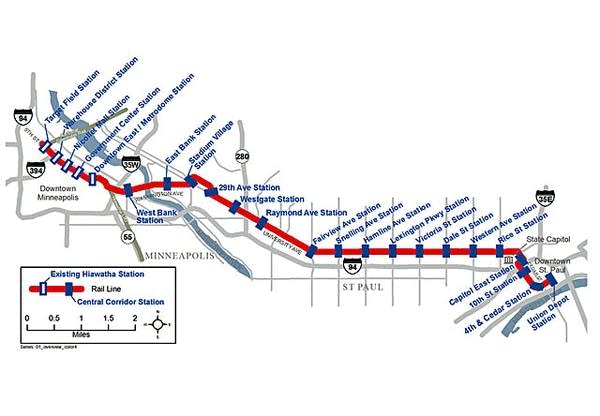St. Paul to fund additional light rail station
Go Deeper.
Create an account or log in to save stories.
Like this?
Thanks for liking this story! We have added it to a list of your favorite stories.

There appears to be a solution to a major sticking point with the proposed Central Corridor light rail project that would connect downtown Minneapolis with downtown St. Paul.
Residents in an economically distressed neighborhood along the line in St. Paul have been clamoring, unsuccessfully, for an additional light rail station along University Ave.
Today, St. Paul officials said they will supply the millions of dollars required to build the station. The surprise offer appears to greatly increase chances of an additional station at Western Ave. on University Ave. between the Dale and Rice St. stations.
The Central Corridor Management Committee accepted the offer today. The Metropolitan Council then approved the committee's actions in a meeting this afternoon.
Turn Up Your Support
MPR News helps you turn down the noise and build shared understanding. Turn up your support for this public resource and keep trusted journalism accessible to all.
Mayor Chris Coleman said the city will explore the use of tax increment financing and other tools to raise the $5.2 million.
"We're committed to making sure that at least one of the additional stations that the community has been demanding gets built out from the beginning of the line, and also have set a path forward that a couple of other stations will be built as well," said Coleman.
Coleman's promise comes as the city copes with a budget deficit that has led to budget reductions and layoffs.

The addition of at least one more station along the route has been a top priority of neighborhood activists, since the Dale and Rice St. stations are a mile apart.
Community members say that distance is too far, and puts residents and businesses in between at a disadvantage, compared to other segments of the line where stations are much closer.
Several of the 15 stations along the line in more densely populated areas are less than half a mile apart.
City, county and Met Council officials have assured residents all along they support an additional station.
The problem is, at this point in the process, adding a station to the application already before the Federal Transit administration will cause a delay that could add millions in costs or even threaten the building of the line.
Met Council Chairman Peter Bell says using local dollars to finance the new station, and keeping it out of the final application, avoids any federal objections.
"That's going to be funded 100 percent local dollars by St. Paul, which puts the FTA at ease," said Bell. "The other thing we had to do was to tell the FTA that was not going to happen at this stage of the project."
Bell says building the additional station will be done after the Met Council has received a guarantee from the federal government that it will pay half the cost of the project. Officials expect the project will cost up to $941 million.

However the Federal Transit Administration does want some additional environmental study of how an additional station would affect the project.
Ramsey County Commissioner Toni Carter says the county is prepared to pay for that.
"Ramsey County commissioners are committed to going to our board to fund that environmental review. The City of St. Paul is committed to funding the station," said Carter. "We are confident that documentation will happen quickly, that we'll add a station. We are planning for the station and it will be built during the construction process."
There was more good news for supporters of the Central Corridor project today, as the FTA signaled it is satisfied at this point with plans for the project.
That allows the Met Council to accelerate and expand preliminary construction work that could begin as early as next week.
All of today's good news for Central Corridor supporters is of little comfort to business owners along the University Ave. route, who continue to express concerns that four years of construction could doom their businesses.
A group of business owners met today to discuss their ongoing concerns. They say their voices aren't being heard.
Lysa Bui, who owns the Saigon restaurant, says her business and many others won't be able to survive the four-year construction project.
"We're not asking for money for a new building. We're not asking for money to buy a new table, new chair," said Bui. "We're not asking you guys -- Met Council -- for money to buy new inventory. We're just asking to be compensated for what we will lose during and after construction."
Met Council officials say they've talked with University Ave. business owners several times. But project planners say there's no money available in the budget to compensate businesses that may lose customers during the construction.
"There's absolutely no money in the project budget for handouts, or to give people money," said Central Corridor spokeswoman Laura Baenen. "We're not doing it."
However, Baenen said the project is paying for what she calls "construction mitigation," including new signage and efforts to maintain access to affected businesses.
Baenen said she did not know how much those efforts would cost. The project office has hired a number of bilingual staff to work with business owners over the past two years.
In addition, the project is partnering with three groups that offer free business consulting services, such as retail management and marketing to help businesses cope with construction, Baenen said.



